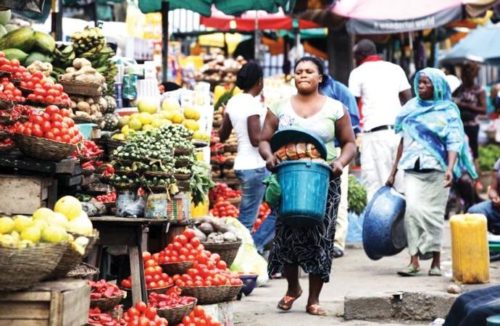
The consumer price index (CPI), which measures the rate of change in prices of goods and services, rose to 21.91 per cent in February 2023, up from 21.82 per cent in the previous month.
The inflation rate data is contained the latest CPI report released on Wednesday by the National Bureau of Statistics (NBS).
The February increase is the second consecutive rise in the country’s inflation figure this year, as Nigerians struggle to access cash for their daily needs — a challenge caused by the naira redesign policy of the Central Bank of Nigeria (CBN).
“The February 2023 inflation rate showed an increase of 0.09 percent points when compared to that of January 2023 headline inflation rate. Similarly, on a year-on-year basis, the headline inflation rate was 6.21 percent points higher compared to the rate recorded in February 2022, which was 15.70 per cent.
“This shows that the headline inflation rate (year-on-year basis) increased in February 2023 when compared to the same month in the preceding year (i.e., February 2022).
“On a month-on-month basis, the percentage change in the all-items index in February 2023 was 1.71 percent, which was 0.16 percent points lower than the rate recorded in January 2023 (1.87 percent),” NBS said.
The statistics body explained that the percentage change in the average CPI for the 12 months period ending February 2023 over the average of the CPI for the previous 12 months period was 19.87 percent, showing a 3.15 percent points increase compared to 16.73 percent recorded in February 2022.
It said food inflation rate in February 2023 was 24.35 percent on a year-on-year basis — representing a 7.24 percent points increase compared to the 17.11 percent recorded in February 2022.
The rise in food inflation, according to NBS, was caused by increases in prices of oil and fat, bread and cereals, potatoes, yam and other tubers, fish, fruits, meat, vegetable, and food product.
On a state profile, Kwara, Imo, and Lagos residents paid more for food in the period under review.
“On a month-on-month basis, the food inflation rate in February 2023 was 1.90 per cent, indicating a 0.18 per cent points decrease compared to the rate recorded in January 2023 (2.08 per cent).
“The average annual rate of food inflation for the twelve-months ending February 2023 over the previous twelve-months average was 22.12 per cent, which was a 2.44 per cent points increase from the average annual rate of change recorded in February 2022 (19.69 per cent).
“In February 2023, food inflation on a year-on-year basis was highest in Kwara (29.51 per cent), Imo (27.47 per cent), and Lagos (27.42 per cent); while Sokoto (18.54 per cent), Jigawa (19.67 per cent), and Yobe (21.89 per cent) recorded the slowest rise.
“On a month-on-month basis, however, February 2023 food inflation was highest in Yobe (3.15 per cent), Edo (3.03 per cent), and Ogun (2.90 per cent); while Rivers (0.75 per cent), Sokoto (0.89 per cent), and Nasarawa (0.90 per cent) recorded the lowest,” the report added.
Copyright Ships & Ports Ltd. Permission to use quotations from this article is granted subject to appropriate credit given to www.shipsandports.com.ng as the source.